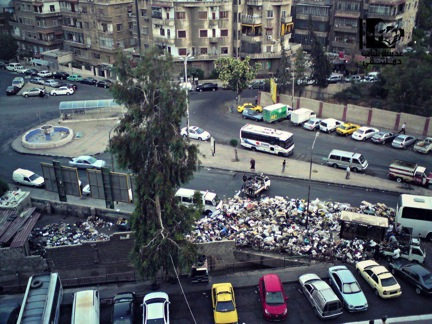In Damascus, members of various local coordinating committees have been organizing for three days to find shelter for residents of areas of the city which have witnessed heavy clashes between the the Syrian regime army and the Free Syrian Army.
Activists have been circulating maps on social networking sites showing refugees the best paths to schools that have been reopened in the past few days as shelters. They have mostly been bringing people to safety on foot, as there is very little petrol left for cars.

[Map circulated on 21 July of safe shelters in Abasseen Square.]

[Map showing safe passage for refugees in Damascus.]
Other calls have been circulated for the collection of donations of food, clothing, and drinks to various points in the city, most of them recently opened public schools, as well as simple graphic instructions for Damascenes to follow in case the violence reaches their neighborhoods. However, even in neighborhoods which have remained calm, most restaurants have closed and people have trouble finding basic necessities, such as bread.
LCCs in various parts of the city have began to coordinate garbage collecting. The streets in Damascus have begun to fill with trash as the state presence there is weakening and the government has become incapable of providing basic services.

[Trash piling up in Rukin ad-Din.]

[Picture circulated on Facebook : “Please circulate this picture to help volunteers in the
coming days, as they are undertaking a campaign to help clean the garbage in the
streets. Put the trash in the bag and close it well!"]
The predominant mood among many residents in Damascus appears to be confusion, as multiple conflicting reports come out by the hour, and people are unsure if it is safer to leave their homes or stay inside. Residents of more dangerous areas such as Midan have been moving to safer neighborhoods in the somewhat quieter suburbs of the city.
In Mezzeh, where the presidential palace is located, residents reported that the national army entered the area in the evening and began to arrest young men indiscriminantly.
Beirut has witnessed an enormous influx of Syrian refugees in the past three days, with many coming to Lebanon with no planning and unsure of where they will stay. Syrians coming to Lebanon have reported waiting up to seven hours to cross the border. The UNHCR reported that Lebanon has received at least 30,000 Syrians in the past four days.